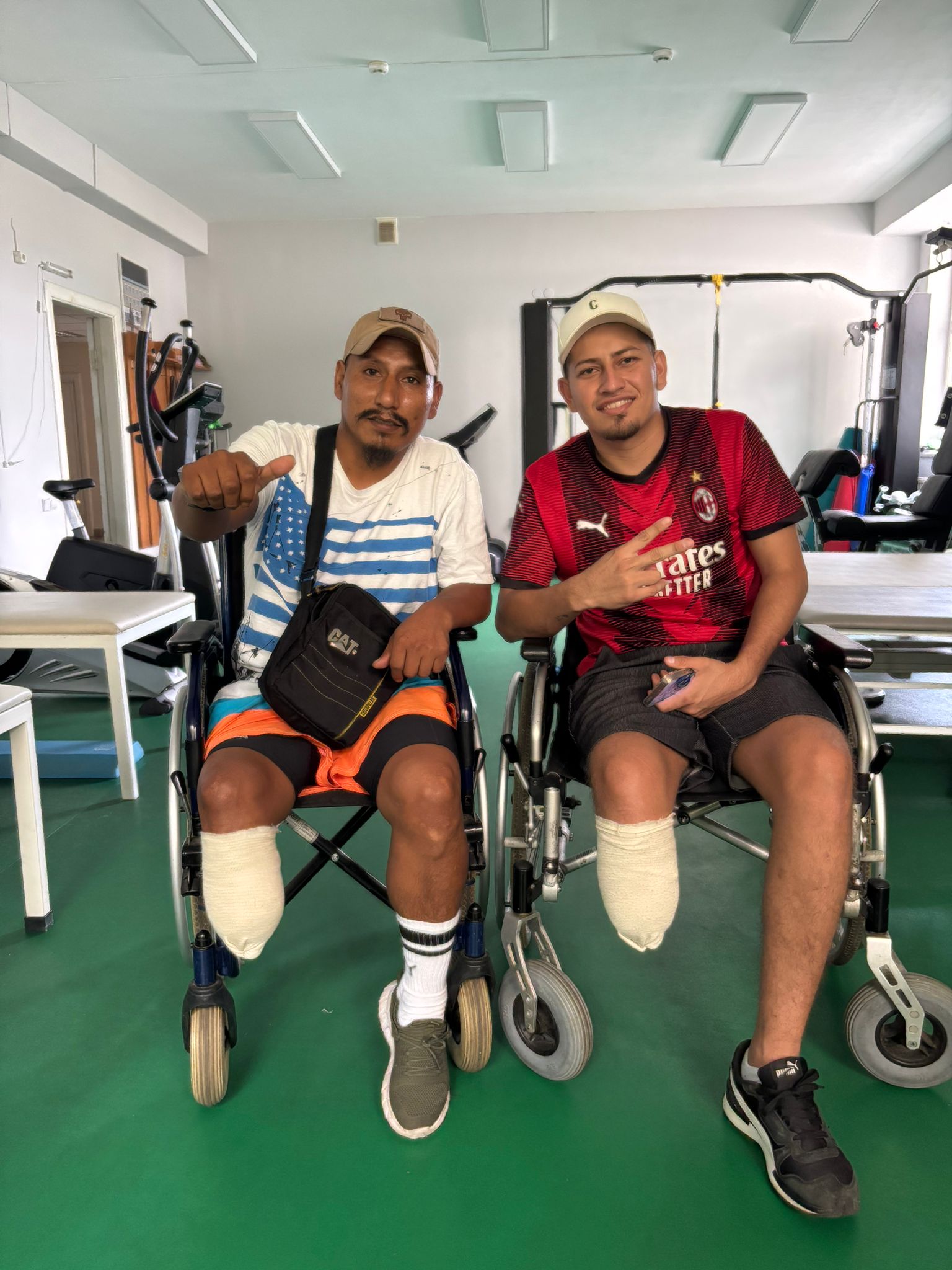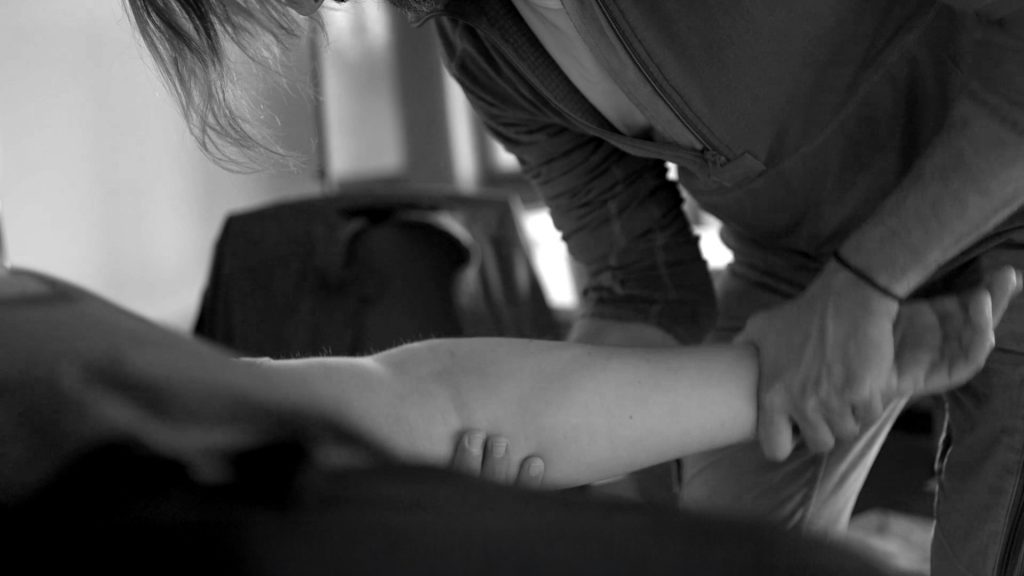Notes from the border: chronicle of a rescue in Lviv
In the hospitals of Lviv, stories are not told – they are spat out. They are stories of people who have already lost more than they have, and yet they resist. Mono and Vasili, two Colombians, are proof of this. Both lost their legs below the knee, both dragged their bodies and their fears for four days in no man’s land, and both have returned from where others do not return.

Chronicle of a Rescue at the Border (Lviv, Ukraine)
It all started when Mono (on the right in the picture), who had just turned 23, stepped on a mine and lost his right foot. Vasili, 34, his companion and friend (on the left), applied a tourniquet and took off everything that weighed him down: his vest, backpack and rifle. Mono kept only the essentials, only what he needed to survive.
Then, the impossible retreat began: Vasili advanced a few metres through the minefield, feeling the ground, looking for shelter. When he found it, he left his equipment there, crawled back for Mono, and together they moved on to the next point.
On one of these trips back and forth, they found a disoriented Ukrainian soldier, bleeding from his ears, with a lost look in his eyes and greyish skin. No one knows how long he had been there. They included him in their slow advance, securing positions, moving him to the next patch of shade, but hell waits for no one. In the middle of a bombardment, the Ukrainian got lost, strayed from the path and disappeared into the bushes. They called out to him, but there was no answer.
Then Vasili also stepped on a mine. The explosion was sharp and brutal. He felt a tug on his leg as if something had lifted him off the ground. He took off his helmet, vest and backpack; he made two tourniquets, one high on his groin, the other lower down. He shouted at Mono to come, not so much because he needed him, but to give him a reason to keep fighting. When you’re at the limit, any excuse will do to keep you from dying.
For four days, they advanced like wounded animals. No marked paths—too much danger from mines—, but across country: cutting branches, crawling through mud and undergrowth, advancing five, ten or twenty metres. They would stop, loosen a tourniquet to let the blood flow, count the minutes so as not to bleed to death, tighten it again and start all over.
The nights were a miserable respite. They found a bunker with two torn mattresses and made use of a thermal blanket that Vasili was carrying. They slept huddled together, shivering with cold, caressed by air that smelled of fear and dried blood.
“You saved my life, and now I’m going to save yours. You came to help me and defended my position when we were under attack, and thanks to you I’m still here. I’m not going to leave you behind.”
On the second or third night, they heard footsteps. Two Ukrainian soldiers, artillerymen from another brigade, entered the bunker. They told them they weren’t there for them, that they were just passing through, but promised to send someone to rescue them at dawn. That promise sparked a glimmer of hope, but in the morning no one came. Here, promises last as long as it takes for the sun to rise.
Meanwhile, Vasili continued to talk to his commander on the radio. He begged for them to be evacuated. The response was an order: ‘You have to cross the 400-metre clearing to the position.’ The commander thanked them for their courage and encouraged them to hold out. Vasili explained that this was impossible: they could only advance five metres at a time, crawling and stopping for minutes to regain their strength. ‘We can’t do it, we won’t make it. If you can’t save me, at least save Mono,’ he pleaded. Finally, exhausted, he blurted out what anyone would think in his situation: ‘Send me a drone and kill me yourself. I’d rather that than be finished off by a Russian drone in the middle of the clearing.’ When he realised that was all the help he was going to get, he turned off the radio.
The rescue
It was then, mid-morning, that Doggi and a Brazilian colleague appeared. Doggi, also Colombian, recognised Vasili when he saw him and said bluntly: “You saved my life, and now I’m going to save yours. You came to help me and defended my position when we were under attack, and thanks to you, I’m still here. I’m not going to leave you behind.” The Brazilian hesitated, weighing up the risk: crossing that clearing, dragging one of them along, was an invitation to enemy drones. But Doggi insisted, prioritising Mono’s evacuation, as Vasili begged.
Doggi carried Mono, while his Brazilian companion tried to help Vasili, but soon he couldn’t go on. Doggi then went back for Vasili, who insisted on being left behind. But in war, sometimes unfinished business between men weighs more heavily than fear. Doggi hoisted Vasili onto his shoulder and they crossed the clearing, under the buzzing of the drones, until they entered the Ukrainian inhibition zone and the drones fell to the ground, finally useless.
At the evacuation point, a 19-year-old paramedic stabilised Vasili. They still had eight kilometres to carry him on their shoulders to the field hospital. Vasili could only say to the doctor: ‘Do what you have to do with me. Let it be God’s will.’ They anaesthetised him, and when he woke up, he no longer had a foot.

Personal stories matter
…sometimes, dignity is just that: not letting someone die alone…
Personal history matters here. Mono had lost his two brothers days earlier, killed in parallel trenches. Vasili had lost his younger brother, stabbed in Ecuador after a final video call. Perhaps that is why Vasili was determined that if only one of them came out of this alive, it would be Mono. Not for the sake of heroism, but because he understands the weight of grief and how unbearable it is to be left alone in this world.
After the operation, they were sent by train from Kharkiv to Lviv: 20 hours apart in different carriages. Vasili feared that everything would end there. Later, they reunited in the hospital. Mono didn’t speak, didn’t eat, didn’t drink. Vasili, stubborn, gradually gave him back the will to go on: water first, then some food. There are wars that begin when no one is watching anymore.

Today, both are in the rehabilitation centre. I treat their pain and listen to their stories. Vasili, without drama or lament, tells me that he dreamed of his brother encouraging him to survive. There are no heroes here: just people who are determined not to let the other die, because they know how much loss hurts.
Because sometimes that’s what dignity is: not letting yourself die alone, nor leaving the other person alone. The rest is literature.
